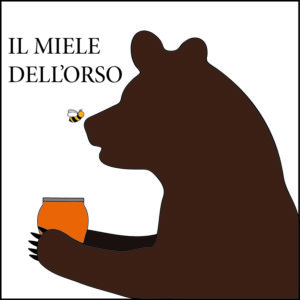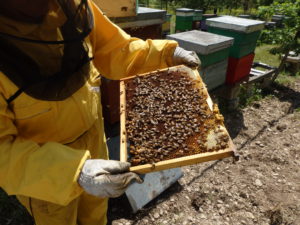Thanks to a grant by: |
Presentation
 The conservation of the remaining population of the Marsican brown bear is indissolubly linked to the preservation of its natural environment and the availability of food sources. More than 80% of the bear’s diet is made up of fruit and plant foods. The project “The Bear’s Honey” refers to the symbiosis between the bear and the bees, not only because of the bears renowned love of honey, but especially because the bear’s omnivorous diet is dependent on the availability of fruit trees and therefore, the fundamental role which bees play in pollination. Bears also play an important part in the creation of plant ecosystems; they have the digestive system of a carnivore and cannot easily digest seeds, so by disseminating seeds through its excrement bears play their part in plant and tree re-growth. In addition, both the Marsican brown bear (Ursus arctos marsicanus, Altobello 1921) and the Italian honey bee (Apis mellifera ligustica, Spinola 1806) is threatened by the alteration of ecosystems caused by humans. If the bear is critically endangered and on the verge of extinction then the small bees are not safe either. Their decrease is worrying because of their relationship with all life on Earth. As Albert Einstein suggested:
The conservation of the remaining population of the Marsican brown bear is indissolubly linked to the preservation of its natural environment and the availability of food sources. More than 80% of the bear’s diet is made up of fruit and plant foods. The project “The Bear’s Honey” refers to the symbiosis between the bear and the bees, not only because of the bears renowned love of honey, but especially because the bear’s omnivorous diet is dependent on the availability of fruit trees and therefore, the fundamental role which bees play in pollination. Bears also play an important part in the creation of plant ecosystems; they have the digestive system of a carnivore and cannot easily digest seeds, so by disseminating seeds through its excrement bears play their part in plant and tree re-growth. In addition, both the Marsican brown bear (Ursus arctos marsicanus, Altobello 1921) and the Italian honey bee (Apis mellifera ligustica, Spinola 1806) is threatened by the alteration of ecosystems caused by humans. If the bear is critically endangered and on the verge of extinction then the small bees are not safe either. Their decrease is worrying because of their relationship with all life on Earth. As Albert Einstein suggested:
“If the bee disappeared off the surface of the earth then man would only have four years of life left. No more bees, no more pollination, no more plants, no more animals, no more man.”
Area of intervention
The area of intervention is the home range of the Marsican brown bear which covers about 1,500 – 2,500 km2 and includes three regions – Abruzzo, Lazio and Molise.
Main purpose
Conservation of biodiversity and ecosystems.
Significance
 The overall goal of our project is to enhance the biodiversity of the ecosystems and increase food sources for the Marsican brown bear through pollinator insects such as Italian honey bees which would replace non-endemic swarms. Another important goal is to reduce human-bear conflicts leading to the potential destruction of the small Marsican bear population in Central Italy.
The overall goal of our project is to enhance the biodiversity of the ecosystems and increase food sources for the Marsican brown bear through pollinator insects such as Italian honey bees which would replace non-endemic swarms. Another important goal is to reduce human-bear conflicts leading to the potential destruction of the small Marsican bear population in Central Italy.
Funding have been used to purchase beehives and electric fences to prevent bear damage. These items have been donated to certain bee keepers in areas frequented by bears. In agreement with Salviamo l’Orso, the honey produced by these hives will compensate for the loss of production of other bee keepers who suffered bear related damage as the regional government compensate only for damage to structures but never for the loss of production. Our proposal aims to make bee keepers more aware of the necessity of protecting their farms and see the bear as added promotional value, instead of a competitor.
Goals
The Project aims to:
- Enhance biodiversity in ecosystems and increase food sources for the bear with the introduction of more pollinator insects.
- Replace swarms of non-native bees with endemic Italian honey bees.
- Establish a trusting and sustained relationship with some bee keepers in the bear’s territory, so that the bear would become a “quality brand” for their product and not a competitor, thanks to education, funding and promotion by Salviamo l’Orso and Patagonia.
- The creation of the bee hives will promptly restore the loss of production of bee keepers who suffered bear related damage and will be an important lesson for beekeepers as to how to protect their businesses in the future.
- Field action for the dissemination of best practice of human-bear coexistence through securing bee farms support.
- Enhancing the bear’s culture, promoting the bear as the real distinctive character of the land.
The above-mentioned goals will be achieved through the following actions:
- Presentation of the project to bee keepers and a contractual agreement with Salviamo l’Orso.
Salviamo l’Orso is encouraging the bee keepers to adhere to the project through securing their bee farms with the received grant, the donation of one bee hive and 60% of its production and the promotion of the project through National and Regional communication media. A bee keeper may be given more bee hives should there be a low participation for this project.
- Restoration of bear damage to other bee keepers with the honey produced by the granted bee hives.
This action is intended to raise awareness amongst bee keepers of the importance of bear proof management of their businesses and the spread of knowledge of best practice to the bee keepers whose damages will be compensated by the production of honey. The compensation in honey production and swarm dispersion will be provided in accordance to the following criteria:
- Areas outside of National Parks;
- Regional Natural Reserves;
- National Parks.
Furthermore, the project will be extended to all citizens through the launch of the initiative “Adopt a bee hive”: every person can make a donation to support the project and purchase bee hives to replace any destroyed by the bears. The donator will receive a a small portion of the yearly production of honey by those bee hives. This action aims to raise awareness amongst people on the issue of human-bear coexistence and allow them to participate in the project’s conservation measures.
Environmental education will be carried out in local schools focusing on bees and their importance for life, food chain and mountain ecosystem with the bear as the top species.
- Extension of the project proposal to other bee keepers.
Budget
5,000 USD
Duration
2016 but extendable to following years.
Target species
Marsican brown bear, Italian honey bee.
This project was written by SLO’s board member Mario Cipollone with the help of Angela Tavone, Samantha Lincoln and Nichola Ciera.










